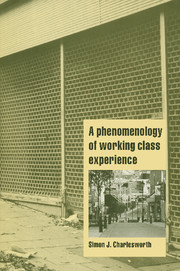Book contents
- Frontmatter
- Contents
- Acknowledgements
- 1 Introduction: Dead Man's Town
- 2 Rotherham: history, demography and place
- 3 Class and the objectifying subject: a reflexive sociology of class experience
- 4 A landscape with figures?
- 5 Understanding the barriers to articulation
- 6 Necessity and being working class
- 7 The culture of necessity and working class speech
- 8 Conclusion
- Notes
- References
- Index
3 - Class and the objectifying subject: a reflexive sociology of class experience
Published online by Cambridge University Press: 22 September 2009
- Frontmatter
- Contents
- Acknowledgements
- 1 Introduction: Dead Man's Town
- 2 Rotherham: history, demography and place
- 3 Class and the objectifying subject: a reflexive sociology of class experience
- 4 A landscape with figures?
- 5 Understanding the barriers to articulation
- 6 Necessity and being working class
- 7 The culture of necessity and working class speech
- 8 Conclusion
- Notes
- References
- Index
Summary
In other words, certain features intrinsic to theoretical cognition encourage us to misinterpret its true nature, to overlook the fact that it is a species of activity, a modified form of practical engagement with the world, and so only possible (as are other, more obviously practical activities) for environed beings, beings whose Being is Being-in-the-world.
(Mulhall 1996: 42)People thinking in the forms of free, detached, disinterested appraisal were unable to accommodate within those forms the experience of violence which in reality annuls such thinking. The almost insoluble task is to let neither the power of others, nor our own powerlessness, stupefy us.
(Adorno 1974: 57)Chapter 2 considered the history of Rotherham, the nature of the population and the current state of the local economy. Yet the demographic and statistical account separates the phenomena recorded from people's experience of them. In itself it tells us nothing of the impact of these phenomena upon what people think or feel. The understanding of place presented in demographic statistics overlooks the everyday spatiality of places, an imbuing of lived meaning originating in the comportment of those who use the space. Objectivist description cannot account for the matrix of meaningful practices through which phenomena actually become meaningful. In order to begin this recovery of an amorphous, ambiguous sense that pervades life here, something that rests beneath other particular experiences, giving a hue to them, I want to consider what made me awake to this concrete experience of the real.
- Type
- Chapter
- Information
- A Phenomenology of Working-Class Experience , pp. 63 - 85Publisher: Cambridge University PressPrint publication year: 1999



